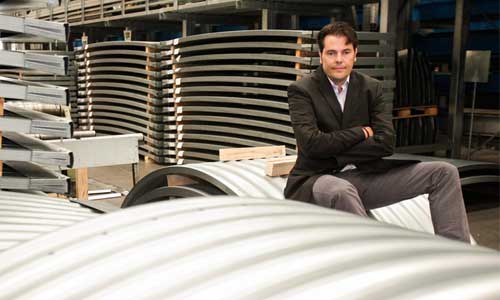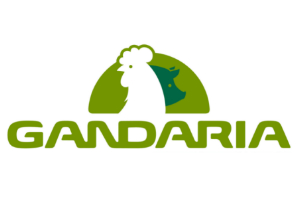Juan Lopez Regalon, Managing Director of Silos Cordoba: “Innovation contributes to export and selling outside helped us to avoid the crisis”
Silos Cordoba is a proper name of the provincial economy. Exporting has made him avoid recession and will close 2013 with 46 million sales. For 2014, he hopes to start works on its new factory.
Silos Cordoba is one of the leaders of the Cordoba economy, especially its export side – in 2012, foreign sales accounted for 82.5% of his billings, which has allowed him to overcome the crisis. Although under that name there is actually a business group formed by Gandaria itself, the main business line of the company, which is dedicated to developing, manufacturing and assembly of facilities for storage and preservation of cereal; and three more divisions. Matra, the conveying machinery company brand; Gandaria, which manufactures and builds livestock facilities and whose plant is in Jerez de los Caballeros; and Quinta Matálica, which makes zinc, copper and titanium coatings and steel structures for buildings. A staff of 104 people and autonomous firms working for the group meaning another 30 or 40 jobs directly linked to the activity of Silos Cordoba. Its Managing Director, Juan Lopez Regalon, told ABC the keys to the extraordinary progress of this firm.
– What is the revenue forecast for 2013?
We”ll be closing with approximately same figures as 2012, with a turnover of 46 million. In 2011, the turnover was around 38.5. But in our business it is necessary to take an average of three or four years. With the type of projects we do, we can have a peak and increase sales and then maybe, fall a little. We must take the average to see the evolution. Our sales average has grown in the five years marked by the crisis.
– What is the secret to increase turnover in times of crisis?
The secret, if one may say so, is the strategy of an internationalization process that started in 1994 and paid off in the mid and long term. Our industry, the infrastructure for agricultural companies – because in the end, the grain storage is infrastructure for the agricultural industry – was already quite developed in Spain. We decided to go abroad at the end of 1994 and today we are in many markets and can overcome the internal crisis .
– Almost 20 years after starting the internationalization process, what percentage of the turnover comes from exports and how many countries do you export to?
In 2012 they accounted for 82.5% and we will move in the same line in 2013. We are in about 30 countries per year. Our main customers are changing. In 2011-2013 Russia has been our main market. This year, it will represent 15% of the turnover. In Russia we build grain storage and conservation facilities. It has a strong agriculture and is modernizing its infrastructure, which are ancient. They need storage capacity and there is money to fund works .
– What do you think about the many firms that have begun to export, pushed by the recession ?
If you start doing so in a desperate way and without a well-defined strategy, the remedy is usually worse than the disease. But, of course, selling abroad is always good because ultimately, it helps diversify risk.
– Your high level of exports has allowed you to dodge the crisis?
Yes, thanks to the sales abroad we are marching to the pace of the global economy, not the Spanish economy.
– Anyway, your company has several divisions. Has any of them been hit by the crisis?
Yes, Gandaria and Quinta Metalica were very affected. When the recession came they were not going abroad and we started to do so obliged by the crisis. Why did that happen? Because of the day to day work. Fortunately, we are using the experience of Gandaria to improve the results.
– Which markets do you expect to reach in the short term?
We are placing special emphasis on African countries. Seven out of the 15 fastest growing nations in agricultural production belong to the African continent. We are doing actions to enter some African countries in the short term, such as Angola, where we are starting, Mozambique, where we are already working on some projects, Nigeria and South Africa. Besides, there is Brazil, with a growing agricultural production, in need of infrastructure for big capacities of grain storage. Brazil is a highly protectionist country, and we’re considering what strategy to use to enter this market.
We’ve already spent two years making efforts in Asia. We are already selling in Vietnam, but we aim to enter Thailand, where we have already worked in minor projects, and Malaysia.
– But there is another important aspect that differentiates the activity of Silos Córdoba, which is innovation. In May, it was announced that the company moved its R & D department to Rabanales 21. Why did you decide to settle there?
In a first place, we moved there because we had no place here, at Las Quemadas. But then, we saw other advantages. In addition, we changed the organization chart: we got the product development out of the technical department and gave it a stronger entity. Because the projects have a compliance date of delivery and thus, development and innovation was done only on the spare time.
– What are the advantages offered by Rabanales 21?
We are close to the research groups of the University, we work on international standards and constructive solutions. It has an infrastructure for all types of meetings and we have been given space to mount a pilot plant for engine testing and product improvements.
– But you have spent many years with the commitment to innovation. Why R&D is crucial for Silos Córdoba?
In order to make an exportable product and have competitive differences, you have to do something different. We have always focused on development and innovation to be competitive abroad, but in our lat strategic plan for the next five years we want to position ourselves in solutions for preserving and storing cereal, not just the silo facility itself. There is a higher bet for innovation and development to further differentiate this new vision of the business: provide comprehensive solutions for storage and preservation of cereal.
– So, to compete abroad there is no choice but differentiation and excellence?
Of course. In our industry, we have competitors from Turkey and China, whose main strength is the price.
– How much innovation has helped avoid the crisis?
You have to innovate in order to sell abroad. Innovation has helped us to export and exports have helped us avoid the crisis. Our investment is almost all focused on processes or products innovation. In 2012 the investment in R & D accounted for 70 % or 80% of total investments. In 2013 the percentage will be similar.
– You plan to build a factory in El Carpio. How is it going?
It is slowing down a bit, but the idea is that we start the works in 2014. In 2015 it would be operational. The facilities at Las Quemadas are running small. In production peaks we are quite tight. There, we will have 10,000 meters for manufacturing and warehouse. The approach is to leave this office and move to El Carpio. We also have the possibility to make a rail detour for the reception of coils, raw material and the output of our containers. That would be made in a second stage.
– How much will Silos Cordoba invest in the factory in El Carpio?
The planned investment is six million euros.
– In terms of activity where do you want to grow?
We have a strategic plan for the next five years. And our vision is not only be specialists in the silo, but in storage solutions for the entire project. We have always made machinery for the handling and storage, but now, we want to offer a turnkey solution, not only the plant automation, which we are doing, but the whole process. From the moment the grain arrives in a combine or a truck, to consumption, it needs to be cleaned, dried and stored. We want to be offer a turnkey solution including all these processes. That is what we are working on now and we want to position ourselves as leaders in Europe in offering that solution. Now, we are best known for the manufacture of silo, an area in which we are among the European leaders, and some machines, but not for the turnkey solution.
Highlights:
Export in 2012 represented 82% of turnover and in 2013 we will move in line.
Innovation. Last year, the investment on R & D accounted for 70% or 80% of total investment.
New facilities. The idea is to start works at the factory in El Carpio in 2014. The investment will be of 6 million euros.
Source: ABC








